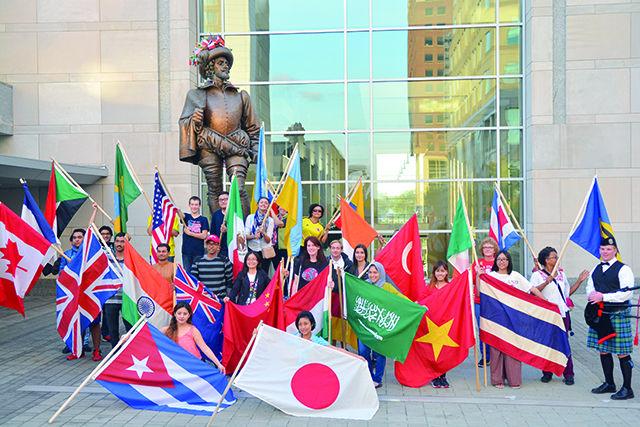
Alix Vo
The 20th annual International Festival of Raleigh was on Oct 9-Oct 11. Attendees were able to enjoy different foods, walk through a bazaar and cultural exhibits of many countries. There were also stages where people could enjoy dance performances throughout the day or engage in planned activities where they would be able to learn about different cultures.
The United States Citizenship and Immigration Services naturalized 120 international-born candidates who took the Oath of Allegiance to become naturalized U.S. citizens Friday afternoon to kick off the 30th annual International Festival of Raleigh.
More than 60 nations were represented at the festival, which took place Friday through Sunday at the Raleigh Convention Center and featured 28 cafes, a kid’s corner and a beer garden with brews from around the world.
Friday evening at the Sir Walter Raleigh statue outside the International Festival, volunteers from NC State and other attendees marched in the Parade of Flags, a new event at the festival.
“Bearta Al-Chacar, International Festival chair and board member, approached us at Packapalooza and asked us if we wanted to do the Parade of Flags at the International Festival,” said Megan Landwehr, communications and media specialist for the Office of International Affairs at NC State. “The flags we used in the parade used to hang from the ceilings of the old Talley Student Union, and when they didn’t have room in the new Talley to hang them, the Office of International Affairs repurposed them.”
Al-Chacar said NC State’s Khayrallah Center for Lebanese Diaspora had its own booth near the entrance of the festival. Similar to the Xbox Kinect game, which allows players to dance and move to the steps of a song, attendees could learn and participate in an international dance.
Hamdee Khader, a junior studying business administration, volunteered at the festival.
“It’s my first time coming to the International Festival, but I’m volunteering at the Palestinian booth,” Khader said. “It’s really energetic, seeing people from all these different nationalities, and you get to learn about their culture.”
Lela Ali, a senior studying international political science, volunteered at a booth nearby the cultural exhibits. Ali works as a consultant for Young People For, a national organization promoting leadership and activism based in Washington, D.C., with branches across the U.S.
“I am tabling with this organization as part of a fellowship program trying to mobilize people of Arab and Southeast Asian backgrounds to vote in the 2016 election,” Ali said. “[The organization] has done a bit of research, and we found that voter turnout rate for Arabs and Southeast Asians put together is less than 3 percent, so we’re trying to increase that number.”
The main stage of the International Festival allowed attendees to relax and enjoy cultural dances and performances.
Rosie Zitawi, a senior studying psychology and interpersonal communication, participated in performing a traditional Palestinian dance called dabke.
“It means ‘stop,’ and it’s very popular in Palestine, Lebanan and Jordan,” Zitawi said. “It’s usually performed at parties or weddings, and the dancers could form a line or a circle.”
Zaid Alemam, a 2015 graduate of Poole College of Management, walked around the bazaars of the festival to learn more about international cultures.
“It’s good to see the whole community come and experience other cultures and different countries, especially in the South,” Alemam said. “It’s something that should be promoted, and it’s good for diversity.”